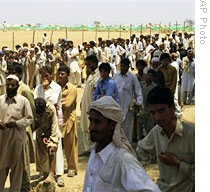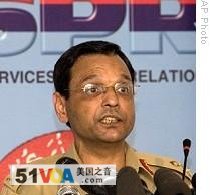Islamabad
29 June 2009
 |
| Pakistanis displaced from Swat and Buner queue to get food relief in Yar Hussain camp in Swabi, 19 Jun 2009 |
The Pakistani army says all main areas in the region occupied by the militants have been cleared.
Army spokesman Major-General Athar Abbas also told reporters Monday that Taliban command structures have been dismantled and their training centers and ammunition dumps have been destroyed. In addition, Abbas says government forces have reopened and secured strategic highway links between the northern part of Swat Valley and the west and have discovered a huge cache of arms and ammunition in the region.
 |
| Major General Athar Abbas (File photo) |
"Please realize that the counter-insurgency operation - where you have to enforce the writ of the government - what was the extent of the writ lost by the government in that area," said General Abbas. "Please keep that in mind. We are getting into an area which, in our view, the government had completely lost the writ of authority. And therefore the operations sometimes in some areas is painfully slow. Because of the terrain, because of the resistance, because of a lack of support and because of the lack of information."
Abbas also asked reporters to remember how many soldiers had lost their lives and how many had been wounded, saying that is the proof of progress.
The government also predicted that within a week, some of the estimated 2.5 million people displaced by the conflict will be able to return in large numbers. And the government says it is taking care of these people, having already distributed hundreds of millions of dollars in cash payments to those who were forced to flee.
Monday's progress report did not include the announcement of the capture or killing of any top Taliban leaders such as Sufi Mohammed, the radical cleric who negotiated the failed deal to impose strict Islamic law in Swat Valley. Nor was there news of the capture of killing of his son-in-law, Maulana Fazllulah, whose followers have fought fierce battles against the army in the region.
A former army lieutenant general and defense analyst, Talat Masood, says until the military eliminates the Taliban leadership in Swat Valley, success against extremists will be elusive.
"That is really the heart of the problem because they can always regroup and come back and keep on motivating people from the outside and be quite dangerous, in fact," said Talat Masood. "You know, directing it from different places. So we have get a hold of the leadership. It's very important."
In the meantime, the army is also pounding targets in nearby South Waziristan in preparation for a full-fledged assault on Taliban leader Baitullah Mehsud and his forces. And on Sunday, troops faced a flare up of militant violence in North Waziristan. The army says militants unleashed a flurry of gunfire - followed by the detonation of improvised explosive devices - on a convoy of security forces. The army says 16 soldiers, including three officers, were killed along with 10 militants.